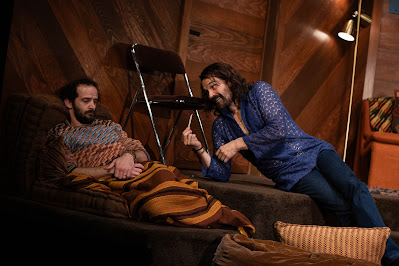Stereophonic (c) Chelcie Parry
☆ Theater: Stereophonic
At Playwrights Horizons
Premise: Have you ever looked at the producer’s credit for Fleetwood Mac’s 1979 Tusk album? It’s “Produced by Fleetwood Mac (Special Thanks to Lindsey Buckingham) With Richard Dashut & Ken Caillat.” Why would Buckingham get such a cushy shoutout since him being part of Fleetwood Mac would have included his contribution? I’m not saying that David Adjmi answers this question, in fact, the band at the center of his fascinating new play Stereophonic is never named and only (cough, cough) tangentially resembles the supergroup from the 1970s. But the playwright does tackle the easily bruised egos of a band trying to record a follow-up album to one of their most successful albums ever (Tusk, by the way, is the follow-up to Rumors) when one member takes on the role of band visionary. That member is guitarist and vocalist Peter (Tom Pecinka), who along with his longtime girlfriend/singer Diana (Sarah Pidgeon) are the American contingency to a band of Brits consisting of bassist Reg (Will Brill), his on-again, off-again girlfriend and band’s keyboardist/singer Holly (Juliana Canfield) and drummer Simon (Chris Stack). They are joined in the Sausalito recording studio by the engineer Grover (Eli Gelb) and his assistant Charlie (Andrew R. Butler). There are a lot of side dramas in between songs, and they become exacerbated as the recording of the album extends to over a year. There’s Peter’s codependency on his girlfriend Diana but his disregard of her feelings in the studio; there’s the stress on Simon, being separated from his wife and children still in England; there’s Holly’s insisting on moving out of the band’s house to live on her own, and then there’s the seemingly bipolar Reg, who’s kind and caring one minute but snorting coke and having a breakdown the next. All this is happening as poor Grover and Charlie try to get things on track and on tape, day-in and day-out.
Stereophonic (c) Chelcie Parry
My Take: I was totally immersed into the retro world of a 1970s recording studio the minute I walked in, thanks to a superbly rendered and seemingly workable control room and recording studio set by David Zinn. The characters are adorned with lived-in costumes by Enver Chakartash and the harsh light in the control room is contrasted beautifully by the aura of the recording booth by Jiyoun Chang. And the sound design by Ryan Rumery is first-rate, especially with the sounds and music from the recording booth. Speaking of music, the band’s songs are provided by Will Butler of the band Arcade Fire, and the songs are the highlights of a production filled with them. They oscillate between an easy-listening groove and a rock and roll hook that will keep you humming for hours after seeing the play. Of course, the actors perform the songs live, and they feel like a band, especially when they perform in longer chunks. If there was ever a need for a cast recording of a production, this would be it. (I wouldn’t call Stereophonic a musical, per se, as all the songs are diegetic, although Butler’s lyrics do uncannily reflect the mood of the characters singing them.) All the actors are top notch, each getting a moment to shine, like when Pidgeon as Diana has to do a pickup for a song and can’t quite hit the note, when Gelb’s engineer is humiliatingly berated for doing something he was told to do, or when Stack as the drummer has a breakdown when trying to figure out a sound problem. This cast is a cohesive engine. If I had any concerns, it would be the length (at over three hours), which doesn’t feel long in the theater, but does repeat some themes or issues unnecessarily. And while the look and vibe of the 1970s are on display, I was hoping for a bit more of the politics of the times (Watergate is a punchline at one point) to give the play a bit more cultural relevance. This is certainly David Adjmi’s best play to date (his earlier plays include Stunning and 3C), with dialogue that is every bit as musical as Butler’s songs. Even at the start of November I can safely say that Stereophonic is one of the most enjoyable and exciting productions we will see this theatrical season.
Stereophonic (c) Chelcie Parry
VIP: Daniel Aukin. There were so many elements of this production that were standouts to me I wanted to highlight, but if there is one person who is a thread through all the things that make this production hum as well as it does, it has to be director Aukin. He is the conductor that makes all the elements sing, both literally and figuratively. Aukin has always been a generous collaborator to playwrights that produced such memorable productions as Bad Jews, Skintight and last season’s audacious Catch as Catch Can. But on Stereophonic, Aukin’s working on another level. All the technical and artistic pieces are in perfect harmony.
If you want to comment on this review, please do so on my Instagram account. All reviews have their own post. And please follow to know when new reviews are released.


